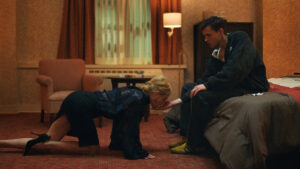Publication Date: 01-03-2025
Babygirl (2024) review
Dir. Halina Reijn
By: Steve Pulaski
Rating: ★★
Halina Reijn’s Babygirl is Fifty Shades of Grey (Oscar Version). A safe, sanitized display of sexual fantasies that seldom comes close to being erotic. It’s so effectively sanitized that it streamlines the kinks inherent to the core of its central BDSM relationship to be palatable for audiences looking for something that won’t unnerve them too much in the current sexless rut that is American cinema. Worst of all, it fails to explore the roots of why this arrangement is so seductive to those who have so much power, they secretly desire to be told what to do.
Babygirl opens with Romy (Nicole Kidman — whose iconic AMC intro is curiously omitted from the film’s theatrical engagement) and her husband, Jacob (Antonio Banderas), having sex. It looks to be a satisfying experience for both. After the fact, however, Romy sneaks downstairs to watch porn and finish the job herself. This sequence of events might spare us a good 20-minute series of vignettes that show that the couple’s marriage isn’t as perfect as their opulent décor and crown molding suggests.

Romy is the CEO of a company that develops robotics for warehouse delivery systems. Her entire job is predicated on removing the human element. Meanwhile, Jacob is a theater director, his job defined by managing humans. Subtlety is not this movie’s strong-suit. It’s on a busy sidewalk that Romy first stops Samuel (Harris Dickinson), who takes control of a loose dog via simple gestures. Later that day, Samuel is part of a cluster of interns brought into work for Romy’s company. He doesn’t look at her like other interns. He looks at her like he’s on her level.
“You like to be told what to do,” Samuel tells her during their first one-on-one session. Romy is floored. Samuel is straight-forward in observations about someone who is naturally intimidated, both at work by her subordinates and her young adult children at home. Everywhere Romy goes, she is feared in some way. But not by Samuel. He begins to initiate a game of commands where he tells her what to do and how to behave. When things eventually turn explicit and sexual, he even has to explain the concept of consent to her.
All this eventually leads to a dingy hotel room where they become lovers. Slowly, Romy lets down her defenses, and before-long, she’s crawling on all fours eating treats out of Samuel’s hands like a dog. This whole scene isn’t as uncomfortable as it is mystifying. To begin with, Samuel isn’t as suave as he believes he is. He looks less like a confident twentysomething and more like a layabout. Nothing about Dickinson’s performance is convincing; a fault of Reijn’s writing more than anything. Before you draw comparisons, he’d have to be assembled in Romy’s factory to be even remotely as robotic as Jamie Dornan.

Babygirl refuses to get too roped into its own sultriness. The sex scenes are disappointingly tame, and if anything, lack narrative tension rather than enhance it. The power dynamics between Romy and Samuel unevenly oscillate back-and-forth, and most of them have her balking at his advances, leading to a frustrating stop-start in pacing. The film also fails to illustrate why this arrangement would be the least bit erotic to Romy. Someone in her position is quietly tired of giving orders, being feared, and worrying about workplace inclusiveness and safe spaces that she, even in a subconscious sense, desires something more daring. She desires someone forceful; so much so she’ll accept attention from someone who looks like he’d come dressed to a job interview in an oversized hoodie and baggie sweatpants.
Much will (and has) been made about Nicole Kidman’s strong performance, but it’s also one we’ve seen before. She’s never been shy about taking on a daring role. One of Reijn’s best sequences in Babygirl comes at a nightclub — a sequence defined by sensory overload thanks to a disorienting strobe effect scored to Yellow Claw’s intoxicating “Crush” — which has Kidman behaving a lot like she did in Stanley Kubrick’s Eyes Wide Shut. She’s no stranger to daring roles.

It’s actually Antonio Banderas who impressed me the most. Banderas is a steady presence throughout, a man whose wife runs the show in work and in life. Where he is the master of his own domain (the theater), his wife is the master of everything else. Banderas’ Jacob manages things, so far as perhaps suspecting something is up with his wife, until he can’t anymore. His explosive scene reminds you, in case you forgotten, that the 64-year-old actor is still capable of delivering a knockout punch.
Babygirl‘s staccato score, a mix of vaporwave, techno, and staccato synths, suggests something sinister is bubbling under the surface. One can hope, with a film featuring erotic scenes that feel genteel and a relationship harboring sloppy power dynamics. Reijn’s previous feature, Bodies Bodies Bodies, showed her playful proclivity for the horror genre. I’m not saying I was hoping for escalating drama, incredulous circumstances, and inconsequential murder, the likes of which commonly found in a Tyler Perry movie, but it might’ve been more palatable than a film masquerading as an affront to social norms that was ultimately content on being a sheep in wolf’s clothing — especially with an ending as ludicrous as they come.
Starring: Nicole Kidman, Harris Dickinson, Antonio Banderas, Sophie Wilde, Esther McGregor, and Vaughan Reilly. Directed by: Halina Reijn.
About Steve Pulaski
Steve Pulaski has been reviewing movies since 2009 for a barrage of different outlets. He graduated North Central College in 2018 and currently works as an on-air radio personality. He also hosts a weekly movie podcast called "Sleepless with Steve," dedicated to film and the film industry, on his YouTube channel. In addition to writing, he's a die-hard Chicago Bears fan and has two cats, appropriately named Siskel and Ebert!


